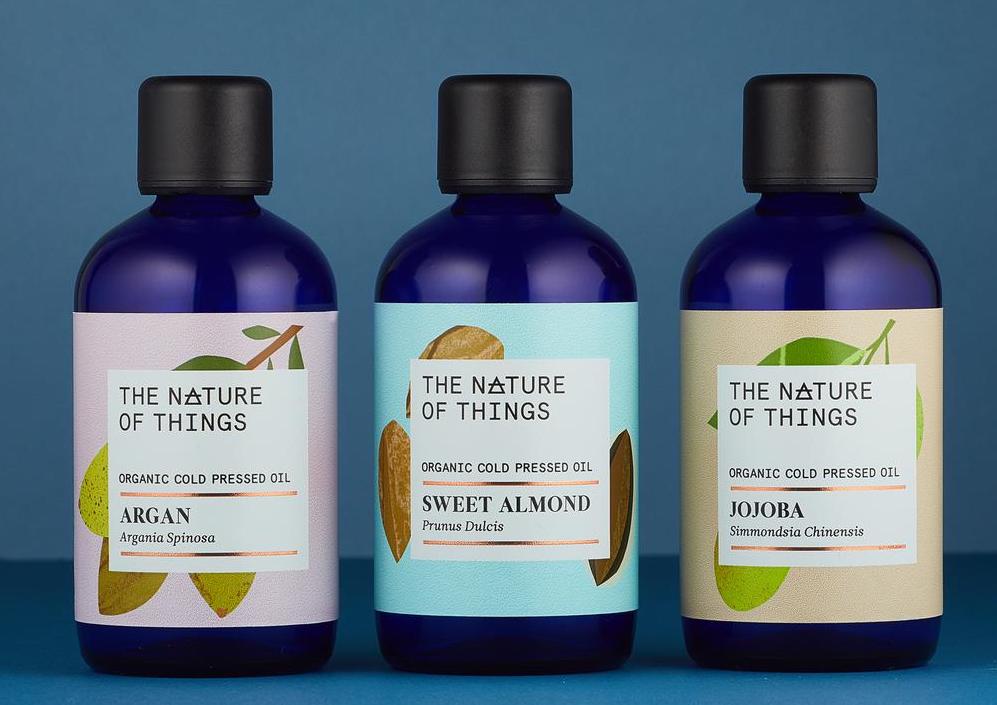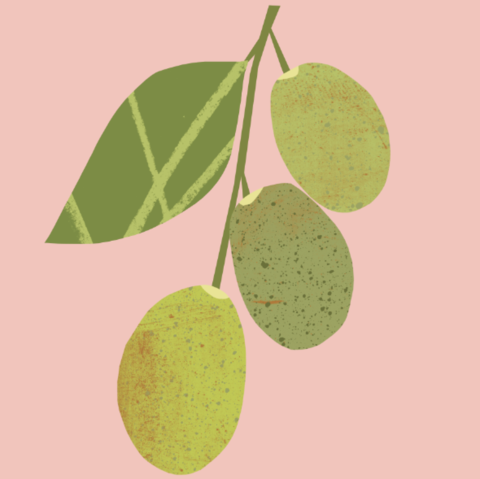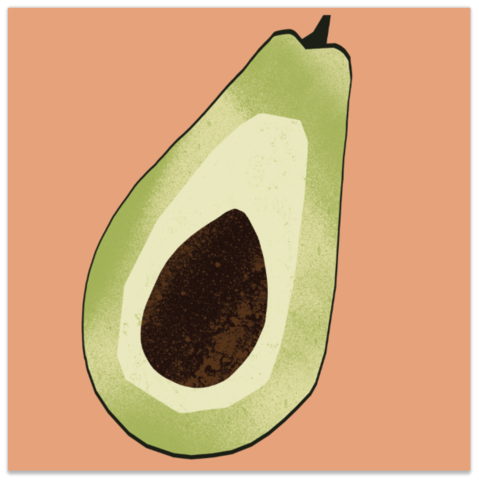BENEFITS OF BODY OILS FOR SKIN AND HAIR
⎼⎼⎼⎼⎼⎼⎼⎼⎼⎼⎼⎼

Vegetable oils - also called ‘carrier’ or ‘base’ oils - are oils that are extracted from various seeds or fruits by a physical process called "cold pressing*, meaning the fruits/seeds/kernels are crushed to squeeze out their oil. These oils are commonly used in cooking (olive oil, sunflower oil) but are also extremely beneficial for skin and hair.
And choosing what oil is best for you will depend on their natural composition and your skin type. To help you chose, here is a little guide about what each oil is good for:

Almond Oil Prunus dulcis
The almond tree (Prunus dulcis) originates in Central Asia and is a member of the Rosaceae family. It is cultivated in Mediterranean countries and in California (more than 80% of global production). Its fruit generally contains a single seed, the almond, from which approximately 50% oil is extracted.
Composition: Sweet almond oil has high quantities of oleic acid, which has emollient properties. It makes the skin soft, supple, and more radiant.
Benefits: Historically, almond oil had been used in Ancient Chinese, Ayurvedic and Greco–Persian schools of medicine to treat dry skin conditions such as psoriasis and eczema. Sweet almond oil has regenerating, restructuring, and moisturizing properties, and it is recommended for dry and delicate skin; it soothes rough and irritated skins.
Applications: Sweet almond oil is used in cosmetic and personal care products, such as skin care, massage oils, make-up removers, moisturizing balms, and hair care.
Skin Type: dry and sensitive skin

Argan Oil Argania spinosa
Argan oil is extracted from the kernel of the fruit of the tree (Argania spinosa). Nicknamed the "the tree of life" this wild, thorny tree grows exclusively in southwestern Morocco. It can grow as high as eight to ten meters and can live up to two hundred years.
Composition: Argan oil is rich in oleic acid, which has emollient properties. It makes the skin soft, supple, and more radiant. Plus, Argan oil has high levels of linoleic acid (omega-6), which is essential since the human body cannot synthesize it. It is known for the important role it plays in the structure of cell membranes. This oil reduces transepidermal water loss by restoring the hydrolipidic film. The skin is moisturized and appears younger.
Benefits: Oils with high linoleic acid content are recommended in cosmetic products made for acne-prone skin because this fatty acid helps regulate sebum production and control breakouts. Due to its tocopherol content, argan oil is ideal for combating skin ageing and drying. It is perfect for fortifying the hair and nails.
Applications: Argan oil is highly prized oil of the cosmetic industry is used in numerous skincare and massage products. Many laboratories also use argan oil in soaps as well as nail and hair care products.
Skin Type: for oily skin

Jojoba Oil Simmondsia chinensis
This oil is extracted from the seeds of a bush (Simmondsia chinensis) that grows in desert regions. It's native to the Southwestern part of North America, more specifically the states of Arizona, Utah and California as well as the Baja California state in Mexico. The oval acorn shaped jojoba seeds contain up to 60% oil.
Composition: Jojoba oil is a liquid wax made up of esters of saturated and mono-unsaturated, fatty acid and fatty alcohols, unlike vegetable oils which are triglyceride esters. It is also rich in unsaponifiable compounds.
Benefits: It penetrates the skin easily and reduces transepidermal water loss by forming a protective film. Jojoba oil also has anti-inflammatory properties, making it an interesting raw material to treat eczema, psoriasis and inflamed skin. This oil is a good emollient and moisturizer for young skin types because it regulates sebum production and is non-comedogenic.
Applications : Jojoba oil is recognized for its moisturizing and nourishing properties and recommended for use in all skincare, make-up, and hair care products
Skin Type: all skin types

Coconut Oil Cocos nucifera
Coconut oil comes from the dried kernel of the coconut (Cocos nucifera), cultivated in coastal areas within 20° of either side of the equator, where the yearly average temperature is around 30°C. The coconut tree reaches its maximum production capacity after 15-20 years, and produces 50 to 100 coconuts per year. Coconuts contain 50 to 68% oil.
Composition: Coconut oil, is rich in lauric acid and other saturated fatty acids that make it solid at temperatures below 25° C. Thus, it is liquid in the countries where it is produced and often solid in the colder western countries! Coconut oil also contains unsaponifiables such as tocopherols and sterols with antioxidant properties and squalene with moisturizing virtues.
Benefits: Coconut oil reduces transepidermal water loss by restoring the skin’s hydrolipidic film. It is particularly appreciated for its emollient, moisturizing, and softening properties. It forms a protective film on skin and hair fibers, protecting them against external aggressions and styling. It adds texture and softness to body butters.
Applications: It is highly nourishing and is therefore recommended for body and hair products: coconut oil provides moisture and shine to dull, damaged hair.
Skin Type: dry and dehydrated skin

Apricot Kernel Oil Prunus armeniaca
The apricot tree is a fruit-bearing tree from the Rosaceae family. Apricot oil is made by pressing the kernels contained within the seed shells.
It has long been believed that the apricot tree comes from Armenia, hence its scientific name, Prunus armeniaca. The word apricot is derived from an Arabic term, albarquq, meaning “early”, since the apricot tree blooms very early in the spring.
Composition: Apricot kernel oil is very rich in oleic acid, which has emollient properties. It makes the skin soft, supple, and more radiant. Apricot kernel oil also contains linoleic acid (omega-6), which is essential, because the human body cannot synthesize it. It is known for the important role it plays in the structure of cell membranes.
Benefits: This oil reduces transepidermal water loss by restoring the hydrolipidic film. Apricot kernel oil has regenerative properties, acting as an excellent skin moisturizer and fighting against skin ageing.
Applications: This oil can be added to massage and skincare products to add a touch of radiance to all skin types.
Skin Type: all skin types

Avocado Oil Persea gratissima
The avocado is the fruit of the avocado tree (Persea gratissima), which comes from the Lauraceae family and originates in Mexico and Guatemala. Avocado pulp contains 5 to 30% of oils.
Composition: Avocado oil has high levels of palmitoleic acid, which penetrates easily while leaving behind a protective layer, making it ideal for delicate skin. It is also rich in oleic acid, which has emollient properties. This oil makes the skin soft and supple and improves its elasticity. Avocado oil contains large quantities of unsaponifiable compounds (tocopherols, sterols, terpenic alcohol, polyols, hydrocarbons, etc.) with antioxidant, anti-inflammatory, and healing properties.
Benefits: Avocado oil moisturizes, fortifies, regenerates, and protects the skin. It also combats skin ageing and activates collagensynthesis.
Applications: It is of interest to the pharmaceutical and cosmetics industries and in soap making. This oil is used to make products for the hair, nails, face, and body.
Skin: dry, dehydrated and sensitive skin
Source: The Nature of Things


